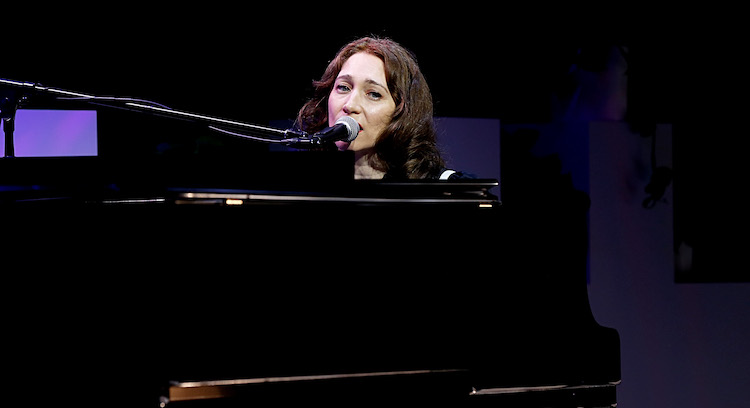In 2012, the Russian-Jewish singer-songwriter Regina Spektor performed at a fundraiser for the Hebrew Immigrant Aid Society in New York. Spektor had already achieved mainstream radio success, and HIAS had helped Spektor’s family emigrate from the Soviet Union when she was a child. All those years later, she still wanted to show her appreciation. Members of her family were in the audience, and the combination of nerves and a pronounced cough led to her making mistakes, starting songs over, and bashfully apologizing: The opportunity to show her gratitude and share the occasion with a theater full of American Jews, many of whom had similar life stories, was simply too important to her to let herself take a sick day. It was a deeply charming, intimate moment, and in some important ways a microcosm of the modern American Jewish experience.
This past Saturday night, Spektor was again moved to talk about her family’s emigration—but for dispiriting reasons.
On stage in Portland, as captured on a video taken by one of the concertgoers and posted on YouTube, Spektor was loudly heckled by a couple of pro-Palestinian bigots, who interrupted the performance of a Jewish woman as retribution for actions taken by Israel. This is textbook anti-Semitism, and Spektor wasted no time calling it out:
Heckler: “Free f–king Palestine! Free f–king Palestine!”
Spektor: “You’re just yelling at a Jew.”
That exchange is typical. There is a not-insignificant portion of the Western activist class that, upon seeing a Jew, yells. Just… yells.
Spektor then seemed to have noticed the heckler was on their way out. “You can leave the show if you want. This is not an internet comment section.” To which the heckler said: “I’m watching dying children. That hurts.” Spektor then explained that “this is not the place for that conversation. I’m a real person who came here to play music.”
Others also apparently came to the show to hear a singing Jewess denounce her people, and left as she indicated she would not do so. Spektor then referenced her family’s history: “The only reason I even speak English is because I came here to escape this s–t. I only speak English because I came from a country where people were treating Jews as others, and now I’m being othered here, and it sucks. It’ll be nice if one of my family’s generation didn’t have to go to a new country and learn a new language, just stay put, have nice lives, you guys.”
Music websites that covered the encounter—which Spektor handled perfectly, and any normal society would see her response as a deserved rebuke of the anti-Semitic hecklers—made sure to add snide closing paragraphs criticizing Spektor. Over the course of her career, Spektor has now gone from cheered to jeered for embracing her faith and her family’s story. It is a disturbing sign of a cultural shift, especially in the arts.
Across the pond, the situation is similar. Jewish comedian Philip Simon was preparing to perform his one-man show at the upcoming Edinburgh Festival Fringe when he received the following note from the host venue: “We feel it is inappropriate for us to provide a platform for performers whose views and actions align with the rhetoric and symbology of groups associated with humanitarian violations.”
I want to repeat that last phrase for emphasis: “align with the rhetoric and symbology of groups associated with.”
As Liz Lemon says to Jack Donaghy in a classic 30 Rock exchange: “Just say ‘Jewish,’ this is taking forever.”
Specifically, the venue said, Simon’s “views concerning the ongoing humanitarian crisis in Palestine … are in significant conflict with our venue’s stance against the current Israeli government’s policy and actions.”
What are Simon’s expressed views on the conflict? According to Simon, he has “never expressed support for anything other than freeing the hostages and finding a way for peace.”
His views aren’t really at issue, because one would have to be a soulless monster to take issue with his opinion that hostages should be released alive. A second show of his, “Jew-O-Rama,” was canceled by another venue.
Rachel Creeger’s performance of her show, “Ultimate Jewish Mother,” was also canceled by that same venue. (Creeger is an Orthodox Jewish comedian.) According to Creeger, that venue has reassured her in the past: “We’ll look after you, no one messes with OUR Jews.”
Perhaps when they made that promise, they hadn’t considered the symbology of the rhetoric that aligns with groups that are associated with all those other Jews.
The arts are quickly becoming a place where you are told to either denounce the Jews or get off the stage. For non-artists, the lesson is that advocating for the release of innocent hostages is now coded as support for “genocide.” If you thought the anti-Zionist discourse was bad before, the worlds of art and activism are telling us, you ain’t seen nothing yet.


















